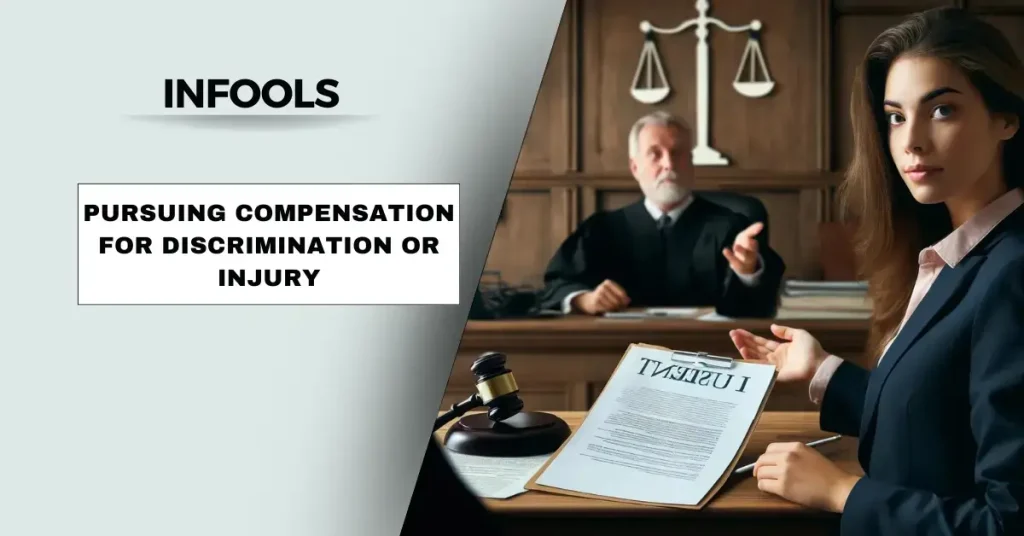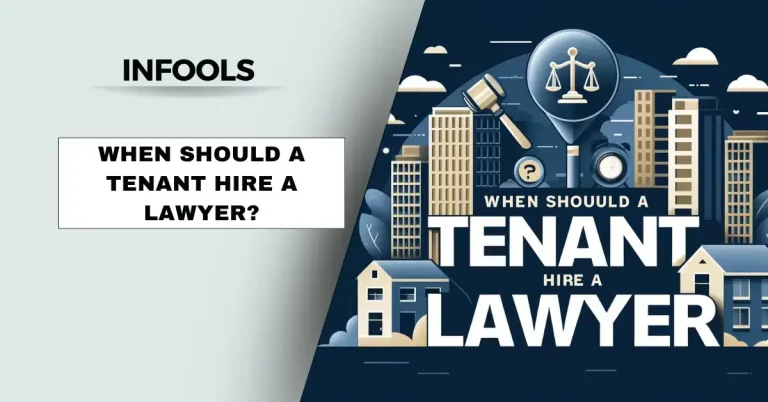When should a tenant hire a lawyer? This question becomes crucial when facing legal issues that could impact your living situation, rights, or financial security.
Hiring a lawyer is advisable when navigating complex landlord-tenant disputes that involve eviction threats, discrimination allegations, or significant repair issues.
This key question often arises during conflicts where tenant rights are at risk and the legalities of housing laws become complex.
Understanding the situations that warrant professional legal assistance helps tenants protect their interests and navigate the challenges of rental agreements and landlord relationships effectively.
Key Points to Remember
- Know Your Rights: Familiarity with your rights under landlord-tenant law is essential. This knowledge can prevent exploitation and guide you in deciding when to seek legal help.
- Documentation is Crucial: Always document interactions with your landlord, especially regarding requests for repairs, notices of eviction, or other disputes.
- Legal Help is Accessible: Whether facing eviction, dealing with discrimination, or simply needing guidance on tenant law, legal resources are available. From pro bono services to paid legal counsel, tenants have options to suit various financial situations.
- Proactive Legal Consultation: Consulting a lawyer early can prevent situations from escalating and provide strategic advice to handle disputes effectively.
Table of Contents
Understanding Your Rights as a Tenant
Basic Rights Under Landlord-Tenant Law
Every tenant has fundamental rights, which include the right to a habitable living environment, the right to privacy, and protection against unlawful discrimination.
These rights are supported by both federal and state laws and are designed to balance the power dynamics between tenants and landlords.
Understanding these can help you recognize when these rights are being violated, warranting legal advice.
Common Issues That Do Not Require Legal Help
Not every disagreement with a landlord needs to escalate to legal representation. Many minor issues, such as small maintenance requests or questions about minor lease terms, can often be resolved through direct communication or mediation.
Knowing what situations typically don’t require a lawyer can save you time and resources.
When Should a Tenant Hire a Lawyer?: Reasons
Facing Eviction Threats
If you receive an eviction notice or your landlord has verbally threatened to evict you, it’s crucial to consult with a tenant attorney.
Eviction procedures must follow legal protocols, and an eviction defense lawyer can ensure your rights are upheld. This is particularly important if the eviction seems retaliatory or without proper cause.
Landlord Bypassing Court Procedures
In cases where a landlord attempts to evict you without a court order, bypassing necessary legal steps, hiring a lawyer becomes essential. This illegal practice, often termed “self-help eviction,” can include changing locks, removing personal belongings, or shutting off utilities to force a tenant out.
Experiencing Discrimination as a Tenant
Discrimination in housing can occur on the basis of race, color, religion, sex, national origin, disability, or familial status.
If you believe your landlord’s actions might be discriminatory, a tenant lawyer can help you file a complaint with the Department of Housing and Urban Development (HUD) or take other legal actions to address the issue.
Legal intervention is necessary to protect your rights and potentially seek compensation for discriminatory practices.
Dealing with Repairs and Maintenance Issues

When Landlord Fails to Make Necessary Repairs
Tenants rely on landlords to maintain rental properties in a habitable condition. When essential repairs, such as heating issues or plumbing problems, are ignored, it can make living conditions unbearable or even unsafe.
In these situations, it’s important to notify your landlord in writing, detailing the issues. If the landlord still fails to address these urgent repairs, a tenant may need to seek legal help.
An attorney can guide you through the process of demanding repairs or possibly withholding rent until the situation is resolved, as allowed by local tenant laws.
Legal Options Available to Enforce Repair Duties
If direct requests for repairs go unaddressed, legal intervention might be necessary. Tenants have a few options: they can potentially arrange for the repairs themselves and deduct the cost from their rent, known as “repair and deduct.”
Another option is to deposit rent payments into an escrow account until the landlord completes the necessary maintenance, a process guided by specific legal requirements that a tenant attorney can explain.
For severe issues, legal action through a housing court may be the appropriate step to compel a landlord to fulfill their obligations.
Read More: How Much Does an Immigration Lawyer Make? 2024
How a Landlord-Tenant Lawyer Can Protect Your Interests
Importance of Hiring a Landlord-Tenant Attorney for Legal Disputes
Having a skilled landlord-tenant lawyer can be crucial when disputes escalate beyond simple communication. An attorney well-versed in landlord-tenant law can offer significant protection for your rights as a tenant.
Whether it’s a dispute over lease violations, security deposit returns, or wrongful eviction attempts, a lawyer will ensure that your interests are robustly defended. This legal support is especially vital in complex cases that involve intricate aspects of tenant law.
Examples of Cases Where Legal Help is Crucial
Legal help becomes indispensable in situations where the tenant’s health, safety, or financial well-being are at risk. Cases involving illegal evictions, severe property neglect, or discrimination require a lawyer’s guidance.
In instances where a landlord uses intimidation tactics or violates privacy rights, legal intervention can help resolve these issues appropriately.
An experienced attorney not only navigates these legal waters but also advocates effectively on your behalf, potentially leading to settlements or court victories that uphold tenant rights.
Cost Considerations: When Should a Tenant Hire a Lawyer?
Expense of Legal Representation
The cost of hiring a tenant lawyer can vary widely based on factors like location, the complexity of the case, and the lawyer’s experience.
Typically, lawyers might charge either a flat fee for simpler cases or an hourly rate for more complex legal disputes.
It’s important for tenants to ask about these costs upfront during the initial consultation to avoid surprises and ensure that the fees are manageable within their budget.
Discussing Pro Bono Lawyers for Tenants’ Rights
For tenants who cannot afford typical attorney fees, pro bono legal services may be available. Many legal aid organizations offer free or low-cost legal representation to low-income individuals.
These services can be invaluable for tenants facing serious issues like eviction or severe landlord disputes. To find pro bono services, tenants can contact local legal aid organizations, check with state bar associations, or inquire at law schools that may have programs offering free legal advice.
Legal Consultation: Your First Step
Importance of Initial Consultation with Tenant Lawyers
An initial consultation with a tenant lawyer is a crucial step in addressing any landlord-tenant issue. This meeting allows the tenant to present their case and receive initial advice on their legal options.
It’s also an opportunity to assess the lawyer’s understanding of landlord-tenant law and their ability to handle your specific situation. Most attorneys offer a free or low-cost initial consultation, which can provide valuable insights into the potential strengths and weaknesses of your case.
What to Expect During the First Meeting
During the first consultation, you should be prepared to discuss the details of your situation and share any relevant documents, such as lease agreements, correspondence with the landlord, or notices received.
The lawyer will likely ask questions to clarify the facts and may explain the applicable laws and how they affect your case. This meeting is also the time to discuss the potential costs of legal representation and understand the lawyer’s approach to handling your case.
Tenant Remedies and Self-Help Measures
Legal Self-Help Options Like Rent Withholding
In some jurisdictions, tenants have the right to withhold rent if their landlord fails to make critical repairs after being notified. This step should only be taken with caution and legal advice, as it can lead to eviction proceedings if not done according to local laws.
A tenant lawyer can explain when and how rent withholding can be used effectively as a tool to compel landlords to fulfill their obligations.
When to Consult a Lawyer Before Taking Action
Before engaging in any self-help measures, consulting a tenant lawyer is advisable. Legal advice is crucial to ensure that any actions you take are within the bounds of the law and will not adversely affect your rights.
For example, if you consider breaking a lease due to uninhabitable living conditions, a lawyer can help negotiate a termination that minimizes penalties or legal repercussions.
Pursuing Compensation for Discrimination or Injury

Steps to Take if You Face Discrimination or Have Been Injured
If you suspect that your landlord has discriminated against you or if you have been injured due to the landlord’s negligence, the first step is to document everything. Keep records of communications, medical reports, and any other evidence related to the issue.
Reporting the discrimination to the Department of Housing and Urban Development (HUD) or your local fair housing agency is critical as they can offer guidance and potentially investigate the matter.
Seeking legal advice as soon as possible is also essential. A tenant lawyer specializing in discrimination or personal injury can help you understand your rights and the potential for pursuing a case. These lawyers can assist in filing the necessary legal claims and represent you in court if needed.
Legal Theories That a Lawyer Might Use in Your Case
In cases of discrimination, legal theories such as violations of the Fair Housing Act might be used. This Act protects tenants from discrimination based on race, color, national origin, religion, sex, familial status, or disability.
If injury is involved, a lawyer might pursue a negligence claim, arguing that the landlord failed to maintain safe living conditions, leading to your injury.
FAQs: When Should a Tenant Hire a Lawyer?
What Should I Ask a Tenant Lawyer During the First Consultation?
When you meet with a tenant lawyer for the first time, ask about their experience with cases similar to yours, their understanding of landlord-tenant law, and their expected approach to your case. Inquire about their fee structure and any additional costs that might arise during legal proceedings. It’s also useful to ask for an estimate of the time it might take to resolve your case.
How Do I Know if My Situation Requires a Tenant Lawyer?
If your issue involves complex legal rights, such as discrimination claims, eviction defense, or substantial disputes over lease terms, it’s wise to consult a tenant lawyer. Also, if you feel overwhelmed by the legal process or uncertain about your rights, seeking legal advice can provide clarity and a strategic approach to addressing the issue.
Can I Afford a Tenant Lawyer?
Discuss payment options with your lawyer. Many tenant lawyers offer flexible payment plans, including contingency fees for certain cases, which means they only get paid if you win. Legal aid societies and pro bono services can also provide assistance if you are unable to afford private attorney fees.
Conclusion – When Should a Tenant Hire a Lawyer?
When should a tenant hire a lawyer? this question is about navigating the complexities of landlord-tenant relationships, understanding when and why to engage a lawyer can significantly bolster a tenant’s legal standing and ensure their rights are protected.
This article has explored various scenarios where legal assistance is crucial, from handling evictions and discrimination to dealing with repairs and understanding the cost implications of legal services.

Morgan Lee is a legal expert specializing in civil rights and corporate law. A graduate from a prestigious law school, Morgan is known for their clear and engaging analysis of complex legal issues, helping readers understand and appreciate the intricacies of law.

